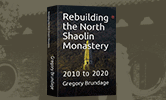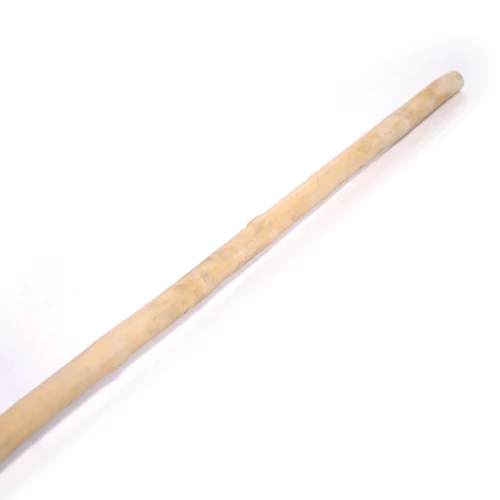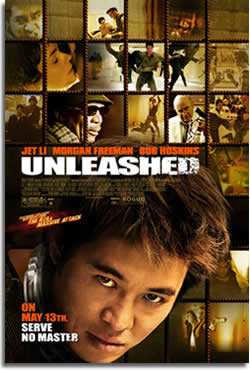 When premium Hong Kong movie stars make the crossover to Hollywood, they are inevitably accused of "selling out" to Hollywood. Now, some could argue that Jackie Chan's RUSH HOUR films are better than his Hong Kong films. Still, they're still not Jackie Chan films, just as John Woo's American films aren't artistically on a par with his Hong Kong films. As I'm making this comment to Jet Li during a recent interview, he begins to grin; he knows what's coming, and he gives me an assuring go-ahead nod.
When premium Hong Kong movie stars make the crossover to Hollywood, they are inevitably accused of "selling out" to Hollywood. Now, some could argue that Jackie Chan's RUSH HOUR films are better than his Hong Kong films. Still, they're still not Jackie Chan films, just as John Woo's American films aren't artistically on a par with his Hong Kong films. As I'm making this comment to Jet Li during a recent interview, he begins to grin; he knows what's coming, and he gives me an assuring go-ahead nod.
It's easy in the press to ask questions willy-nilly under the banner of reporting. But when we write for the martial arts media, we must remember that we're martial artists, speaking to martial artists, and we shouldn't forget the history and brotherhood that is supposed to exist among fellow martial artists. I'll ask the tough questions, but they still need to be tactful and respectful. Jet has no qualms about my insinuation.
"I think it's because we really can not control American films," he tells kungfumagazine.com in improved English, "because the studios control everything. It's like in ROMEO MUST DIE, the ending sequence, they give me three days to shoot; but in Hong Kong, I can control and they give me 20 days to shoot. And of course the whole crew is not my crew, but in Hong Kong, I'm the leader, I'm the one that the whole crew listens to, because I pay the money to them (laughs). But here, nobody listens to you, they don't care because they work for unions, saying, 'Why should I work so fast?' So I only had three days. I'm begging, begging, to everybody to give me just one more day to finish the film. I have three days for three weeks work, it's difficult."
I interject that it was on that last day that a few media people -- including myself -- were flown up to Canada to interview him and Aaliyah. He sits back and grins. "Ah yes, I remember that now, and I didn't do any interview right? (I nod). We met back at Warner Brothers later on. (Second nod).
"Also the final cut is not in my hand. But I'm not complaining, because if I was the studio, I would do the same thing, because they don't know you, it's their money, and always remember this is a business and not about personal philosophy. So that is why I come to Hollywood, I have to prove myself even under these circumstances. I do my best and don't complain.
"So they cut the film, make it choppy, lose sequences, so that's another reason why the fights don't look anything like what I've done in the past and don't look good. But it's not an excuse, just the way things are, because on the other hand, I appreciate the opportunity, because now I can go back to China and make other deals and do something I believe in, like HERO, and then eventually - as I become known - they trust me, they'll work with me. Because my films to come, is about telling a message about helping people. But of course I can also go out of the country and do films overseas like this one, UNLEASHED, which, so far, a lot of people say that I've done a good job; they're surprised I'm doing this kind of film, not a lot of action. It is the hardest film for my acting in my life."
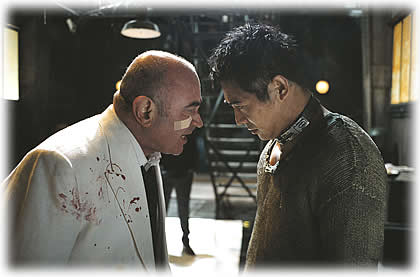
In UNLEASHED, Jet portrays a seemingly timid lad, who - wearing a dog collar and with the mind of a child - has lived the life of an indentured servant and has learned to do one thing: fight like a rabid animal under Pavlovian rule. His "legal guardian," the conniving pariah Bart (Bob Hoskins), manipulates Danny to fight in illegal "death to the loser" fight clubs to earn Bart tons of money. One day, music and a blind man (Morgan Freeman) set off a sequence of events that could either set Danny free or kill the only people he's ever learned to trust.
There is truly a lot of hype and excitement around Jet's performance in UNLEASHED, but only two people know about the tie-in of Besson's THE PROFESSIONAL (1994) and the Hong Kong action film DRAGON FROM RUSSIA (1990) and how this has all led to UNLEASHED. Luc and I.
When I first met Besson at his house in Malibu prior to the release of THE FIFTH ELEMENT, I pointed out to him that some action gags from his film THE PROFESSIONAL (1994) mirrored the Hong Kong film DRAGON FROM RUSSIA (1990). Intrigued, Besson asked me to send him that film and anything else I thought he might like. That tape also included FONG SAI YUK, SAVIOUR OF SOULS and NEW LEGEND OF SHAOLIN. Weeks later, Besson ecstatically told me he loved the action and that one day he'd do something similar. As it turns out, not only was Jet in two of those films, but the action directors were respectively Corey Yuen and Yuen Tak, who have subsequently worked with Besson on KISS OF THE DRAGON and THE TRANSPORTER.
As France's leading action movie specialist, Besson has, over the last several years, moved away from directing and now focuses on producing and writing. Only about half of his movies ever make it over to American video stores. UNLEASHED - one of the most expensive French productions ever - is the second film Li and Besson have worked on together. Louis Leterrier has emerged officially as the film's director, after his co-directorial credit was relegated on THE TRANSPORTER. It's the first movie Li has worked on with fight choreographer Yuen Wo-Ping since BLACK MASK, and the fights are not stylish but brutally damaging.
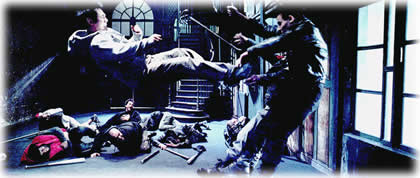
"I've never taken acting class before," Li admits, "and so I learn through working with the director and seeing the emotion of the screen later. But this is the first time I took acting classes, and I tried to tackle it like learning martial arts and how to use your qi. Which part of your qi can you control your smile, or your emotions? So you're not just using your face to show the happy, but to control the inside. And of course I work with Wo-ping before and he's back doing all the action sequences. But now it's not just about fighting and doing kung fu, but how to fight like a dog, because this is a dog's world.
"Usually in fight films, you fight many people, look at them all punch, kick, look at next person, do the movement, and punch, kick. But in this film, the dog - when the dog fights and attacks, it will bite you, bite you, bite you (makes a face like a dog attacking someone). You knock it down, it comes back at you, it ignores you when you hit it, it comes back to whatever it's attacking. And when you hurt him, he doesn't feel it, just focuses on one thing. So we try to do that in the fights and do different martial arts, like doing a crazy dog. And to do this successfully, we need to lose all those Jet Li martial arts moves. Usually I'm the hero doing those signature moves (he jumps up and does his patented Huang Fei Hong pose; wish I had a camera) like the big master. But here, he has to be crazy, not looking pretty, but crazy.
"So then as he gets to know Morgan Freeman, he becomes a bit more human, he understands life, so his bite isn't as bad, and his body, he can control more. But in the swimming pool when he has to fight, he tries to control it, but when they push him down to the bottom, he needs to survive, but wants to be human. What does he do? (smiles) Watch the film. Again, I work very hard on this movie, difficult to play and much suffering."
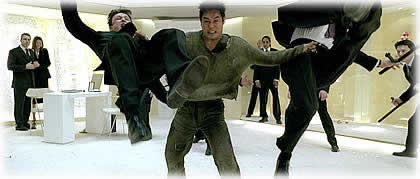
And speaking of Huang Fei Hung, is there any significance to Li when he plays that kind of kung fu hero character compared to Danny in UNLEASHED? Turning philosophical, he points out, "People's lives are like movies. You play your character in real life, do your business, family and friends. Movies put your whole life in a short time. Each film has a different story and life, and you become that person for a few months; and after that you become another person for a few months. In your real life you learn to love, deal with people, how to work and do what you really care about, different cultures and languages. But in film you learn things you may never do, like be a cop or an ancient Chinese hero. But they all have a part in your life and together it all makes you grow as one."
I've interviewed Li six times over the years, which has given me an opportunity to get to know him, to see how he has grown in the industry, how his attitudes have changed; and hopefully Li has gotten to know a little about who the writer is, if I'm just trying to do a job or if he feels I'm passionate about the subject. I figure Jet is comfortable with me when he decides to do the rest of the interview in Mandarin Chinese, which actually makes things much more interesting and informative. I ask him if - after he started making films in China - he ever thought he'd come to America to make films one day.
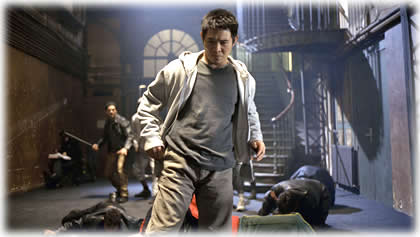
"No," he responds. "Not at that time." Leaning closer, he playfully whacks my arm. "I've never told this to people before, but I was at a crossroads in my life. I mean, I was already the national Wushu champion for five year in China. I had already proved that I could do the Wushu. But of course the realization is, I knew that one day I would lose; I mean, you can't win forever or be a champion for life, and so I thought that this was good enough. I want to change. So that was about 1980. Well, at that time, a good friend of mind, an American, who was a professor at a big University, offered me to come to America to get an education, and that all my tuition and education would be taken care of if I agreed to teach Wushu. Well, then I got an offer to do a film. You obviously know what I chose."
As it turns out, Li's second crossroad came in 1997 when, at that time, Li had decided to retire from film and was investigating Tibetan Buddhism. Li posits, "If you don't understand life, you'll never be happy, because all you'll want is more money, more movies, be like Tom Cruise, Bill Gates, only working for more money. (laughs) But you'll never end up satisfied, because you still want more money. So I wanted to retire and learn Buddhism. My Tibetan master told me that I can not retire and that I have responsibilities to do things in my life. This life is finished, but now you must do something for myself and that I had to figure out what that was on my own. So what was my mission? I didn't know, but I had to search for it, or let it find me.
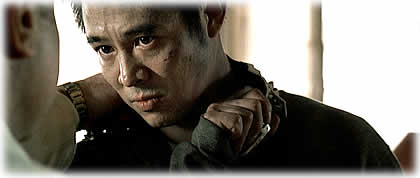
"Well, if you look on my nose-" He points at his nose and leans forward. "-you can see a hole on it where there used to be a big mole. If you look at my old movies, you can see it. He told me to remove that mole. In Chinese, we don't do that, but five days later I went to the hospital and had it removed. Right after the operation, I left the hospital and went back home, and as soon as I put my foot in the front door, the phone rang. It was Warner brothers asking me to come to America to do LETHAL WEAPON 4. It seemed I indeed wasn't ready to retire yet."
Li explains that playing the bad guy in the film didn't go over well in Asia, saying that he got a lot of pressure from the Asian audience and many hated him for being the bad guy. "I always feel that whenever I want to do something in life, the biggest enemy in my life is myself. With LETHAL WEAPON though, it was a challenge to myself, and I had to prove that I could play the part. And now we come to UNLEASHED. Perhaps merely another crossroads? (pause) We'll see."
About
Dr. Craig Reid :
![]() Written by Dr. Craig Reid for KUNGFUMAGAZINE.COM
Written by Dr. Craig Reid for KUNGFUMAGAZINE.COM
![]() Print Friendly Version of This Article
Print Friendly Version of This Article








